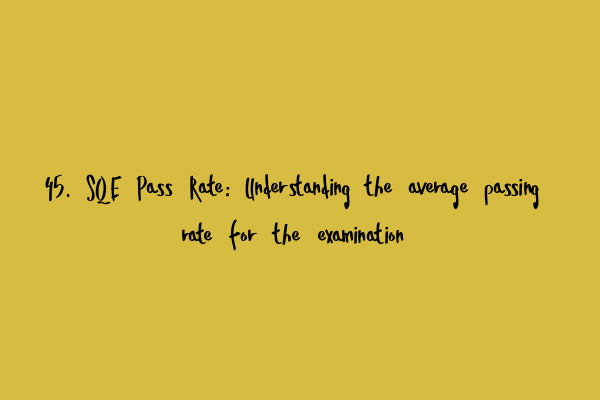SQE Pass Rate: Understanding the average passing rate for the examination
Passing the Solicitors Qualifying Examination (SQE) is a crucial step towards becoming a qualified solicitor. It is natural to be curious about the average pass rate and what it means for your chances of success. In this article, we will delve into the SQE pass rate and provide you with insightful information to help you better understand this important metric.
What is the SQE Pass Rate?
The SQE pass rate refers to the percentage of candidates who successfully pass the examination. It is an important indicator of the difficulty level and overall effectiveness of the examination. The pass rate varies from one examination to another and can fluctuate over time based on a variety of factors.
Factors that Influence the SQE Pass Rate
Several factors can influence the SQE pass rate, and it is essential to understand these factors to gain a realistic perspective. Understanding these factors can help you shape your study strategy and improve your chances of success. Let’s explore some of the key factors:
1. Exam Difficulty:
The level of difficulty of the SQE examination can influence the pass rate. If an examination is particularly challenging, it may result in a lower pass rate. On the other hand, if an examination is relatively easier, it may lead to a higher pass rate.
2. Study Materials:
Access to high-quality study materials is crucial for exam preparation. The availability of comprehensive study resources and mock tests can greatly impact the pass rate. Utilizing reliable study materials can provide candidates with the necessary knowledge and confidence to perform well in the examination.
To enhance your preparation, you can consider using interactive mock tests specifically designed for SQE. These mock tests are designed to enhance engagement and learning, allowing you to practice and familiarize yourself with the examination format. You can find more information on interactive mock tests for SQE here.
3. Study Strategy:
The study strategy adopted by candidates can influence their chances of success. A well-planned study schedule, focused on the key concepts and subject areas, can significantly improve the pass rate. Analyzing mock performance and adjusting your study strategy accordingly can be an effective approach. You can find valuable insights on adjusting your SQE strategy based on mock performance in this article here.
4. Time Management:
Effective time management plays a vital role in exam preparation. Adequate time allocation for studying, reviewing, and practicing is essential for success. Balancing your study time with other commitments and responsibilities is crucial to ensure optimal preparation.
Understanding the Average SQE Pass Rate
The average pass rate for the SQE examination can provide a general indication of the overall difficulty level and the success rate of candidates. However, it is important to note that the pass rate may vary between different parts or stages of the examination. For example, SQE1 and SQE2 may have different pass rates due to their unique formats and subject areas.
To better comprehend the examination, it is helpful to explore focus areas in SQE1 and SQE2 to master key concepts. You can read more about focus areas in SQE1 and SQE2 in this article here.
Conclusion
The SQE pass rate is an important metric to consider when preparing for the examination. While it provides insights into the level of difficulty and overall success rate, it is essential to consider other factors as well, such as exam difficulty, study materials, study strategy, and time management. By understanding these factors and utilizing reliable study resources, you can improve your chances of success.
For further assistance with your SQE preparation, you can explore SQE sample papers to practice for exam success. You can find more information on SQE sample papers here.
Good luck with your SQE journey!
